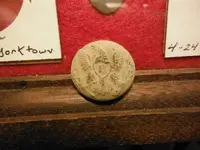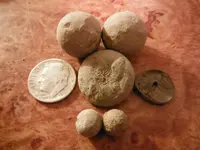Devonrex
Sr. Member
- Joined
- Jan 6, 2012
- Messages
- 351
- Reaction score
- 1,260
- Golden Thread
- 4
- Location
- SE Virginia
- 🥇 Banner finds
- 4
- Detector(s) used
- XP DEUS, Nautilus DMC IIB
- Primary Interest:
- Metal Detecting
Eagle 'R" button.
UNREAL! I just lightly cleaned my Eagle button that I found today thinking it would be just a plain general service and it has an R in the shield for Rifleman! I have never found an Eagle R in this camp! And to make matters that much sweeter it was found within walking distance of my house! It does have a slight push and some ground action as well and it looks like it was never gilted as most were but I am very happy with this find! A coat Rifleman button from the Civil War found in an early 1862 Peninsula Campaign position! I also found a 1948 silver dime, two musket balls, 2 buck balls, and a cuff button back. I havn't been digging a lot lately but I'll take quality over quantity any day and those that know me know I love to dug buttons! I really think this Eagle "R' button was worn by a Confederate soldier as I know many wore them on their uniforms. They were older military uniforms and the Confederate states clothed their men with whatever they could find including uniforms in military surplus storage. This included uniforms with Eagle "R" buttons and the much rarer "V" buttons which were worn in the Mexican conflict and now are pretty much known to have been worn by either Virginia or Louisiana troops. Many articles have been written supporting this theory. Mounted troops first appeared in the U.S. military during the Revolutionary War when Light Dragoon contingents were organized to fight the British. After being disbanded at the conclusion of the war, Dragoon regiments were not seen again un...til 1833. The Dragoon buttons were similar to both the Infantry and Artillery Spread Eagle designs, but had a “D” inscribed upon the shield. In 1842, one regiment of Dragoons was converted into mounted riflemen and issued their own unique buttons with an “R” inscribed upon the shield. The Dragoon and Mounted Riflemen regiments were used up until 1855 when they were converted into U.S. Cavalry Regiments. The Cavalry regiments would have been issued the Spread Eagle design with a “C” inscribed upon the shield, but the antiquated “D” and “R” buttons were worn by veteran military personnel and in 1854, the use of letters on enlisted men’s uniforms was abolished. Cavalry Officers, however, did use the Spread Eagle design with a C inscribed upon the shield until 1902.
Looking at the changes that occurred in just these three branches of service, we can see that changes in buttons and military terminology are part of American Military history. The disbanding of Dragoons and Mounted Riflemen in favor for Cavalry is a complete story in of itself and illustrates changes in military tactics and technology. The replacement of the Spread Eagle design for a general service button for enlisted men in 1854 is another story worth looking into. Yet all of these great illustrations of military history can be told through just the chronology of buttons. Many other artifacts can tell similar stories for their respective cultural materials. Pottery, pipestem, lithic, tombstone and button seriation are just a few examples of how analyzing the archaeological record can lead to an improved understanding of our history. Devonrex
UNREAL! I just lightly cleaned my Eagle button that I found today thinking it would be just a plain general service and it has an R in the shield for Rifleman! I have never found an Eagle R in this camp! And to make matters that much sweeter it was found within walking distance of my house! It does have a slight push and some ground action as well and it looks like it was never gilted as most were but I am very happy with this find! A coat Rifleman button from the Civil War found in an early 1862 Peninsula Campaign position! I also found a 1948 silver dime, two musket balls, 2 buck balls, and a cuff button back. I havn't been digging a lot lately but I'll take quality over quantity any day and those that know me know I love to dug buttons! I really think this Eagle "R' button was worn by a Confederate soldier as I know many wore them on their uniforms. They were older military uniforms and the Confederate states clothed their men with whatever they could find including uniforms in military surplus storage. This included uniforms with Eagle "R" buttons and the much rarer "V" buttons which were worn in the Mexican conflict and now are pretty much known to have been worn by either Virginia or Louisiana troops. Many articles have been written supporting this theory. Mounted troops first appeared in the U.S. military during the Revolutionary War when Light Dragoon contingents were organized to fight the British. After being disbanded at the conclusion of the war, Dragoon regiments were not seen again un...til 1833. The Dragoon buttons were similar to both the Infantry and Artillery Spread Eagle designs, but had a “D” inscribed upon the shield. In 1842, one regiment of Dragoons was converted into mounted riflemen and issued their own unique buttons with an “R” inscribed upon the shield. The Dragoon and Mounted Riflemen regiments were used up until 1855 when they were converted into U.S. Cavalry Regiments. The Cavalry regiments would have been issued the Spread Eagle design with a “C” inscribed upon the shield, but the antiquated “D” and “R” buttons were worn by veteran military personnel and in 1854, the use of letters on enlisted men’s uniforms was abolished. Cavalry Officers, however, did use the Spread Eagle design with a C inscribed upon the shield until 1902.
Looking at the changes that occurred in just these three branches of service, we can see that changes in buttons and military terminology are part of American Military history. The disbanding of Dragoons and Mounted Riflemen in favor for Cavalry is a complete story in of itself and illustrates changes in military tactics and technology. The replacement of the Spread Eagle design for a general service button for enlisted men in 1854 is another story worth looking into. Yet all of these great illustrations of military history can be told through just the chronology of buttons. Many other artifacts can tell similar stories for their respective cultural materials. Pottery, pipestem, lithic, tombstone and button seriation are just a few examples of how analyzing the archaeological record can lead to an improved understanding of our history. Devonrex
Attachments
Last edited:
Upvote
8







